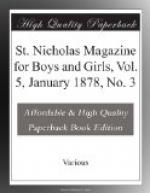“Since the reign of Henry III., when, by that monarch’s gracious act the Lord Mayor of London was permitted to present himself before the Barons of Exchequer at Westminster instead of submitting the citizens’ choice for the king’s personal approval, there has been no Lord Mayor’s show at which so great a concourse of spectators assembled.”
We crowd into the cars and are soon in Cannon street. At the gates a boy meets us with little books for sale, shouting, “Thirteen elephants for a penny! the other boys’ll only give you twelve, but I’ll give you thirteen. Sold again! Thirteen elephants for a penny!” This wonderful book consists of a series of common gaudily colored pictures, supposed to represent the procession, which has done service at the show from time immemorial, but it is each year as welcome as ever to the children who each have a penny to buy one. Through the streets we have passing visions of pink silk stockings, canary-colored breeches, and dark green coats and gold lace, also tri-colored rosettes as large as saucers; and pass by shop-windows full of sweet, eager little faces, in the place of hose, shirts, sewing-machines, etc.
At last we arrive at our destination in Cheapside, where, through the kindness of a friend, a window on the first floor of a large building is waiting for us. How impatient we are until we hear the band of the Grenadier Guards, which heads the procession. After this band and that of the Royal London Militia, come the Worshipful Company of Loriners, preceded by jolly watermen in blue and white striped jerseys and white trousers, bearing banners; more watermen follow to relieve them; the beadle of the company with his staff of office; the clerk in his chariot; the wardens, wearing silk cloaks trimmed with sables, in their carriages, and amongst them Sir John Bennett, the great watch-maker in Cheapside, a charming-looking old gentleman with rosy cheeks and profuse gray curls; his face lights up with smiles as the shouts of “Bravo, Bennett,” show how popular he is.
Then comes a grand yellow coach, in which rides the Master of the Company, attended by his chaplain. After the Loriners come the Farriers, the band of the First Life Guards, banners, beadle and mace clerk, wardens and master. After them the Broderers. As these pass slowly along, an excitement is caused by the behavior of the horse of a hussar, who is mounting guard. It does not like the proceedings at all, and still less the greasy asphalt on which it stands, dances round, backs into the Worshipful Master of Broderers’ carriage, and finally rears and falls, unseating its rider. The hussar is quite cool and quiet, soon reseats himself, and rejects the offer of a fussy little man in red to hold his horse.




